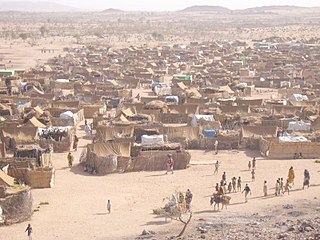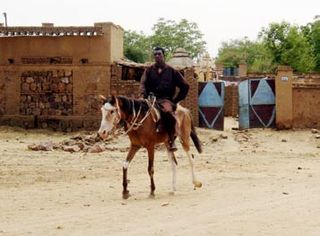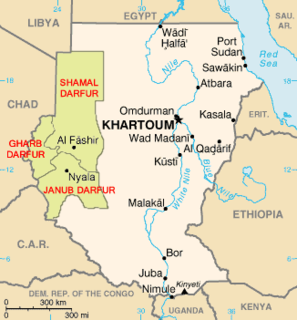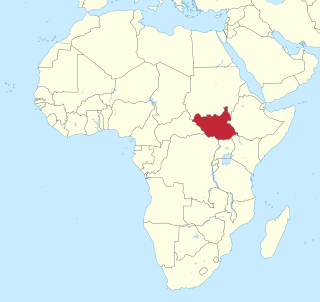
The Abyei Area is an area of 10,546 km2 or 4,072 sq mi in Sudan accorded "special administrative status" by the 2004 Protocol on the Resolution of the Abyei Conflict in the Comprehensive Peace Agreement (CPA) that ended the Second Sudanese Civil War. The capital of Abyei Area is Abyei Town. Under the terms of the Abyei Protocol, the Abyei Area was declared, on an interim basis, to be simultaneously part of the states of West Kordofan (Sudan) and Northern Bahr el Ghazal.

The President of the United Nations Security Council is the presiding officer of that body. The President is the head of the delegation from the United Nations Security Council member state that holds the rotating presidency.

United Nations Security Council Resolution 1919, adopted unanimously on April 29, 2010, after recalling resolutions 1674 (2006), 1894 (2009) on the protection of civilians in armed conflict, 1612 (2005) and 1882 (2009) on children in armed conflict, 1502 (2003) on the protection of humanitarian and United Nations personnel, and 1325 (2000), 1820 (2008), 1888 (2009), and 1889 (2009) on women, peace, and security, the Council extended the mandate of the United Nations Mission in Sudan (UNMIS) until April 30, 2011 with the intention of renewing it further if necessary.

United Nations Security Council Resolution 1585, adopted unanimously on 10 March 2005, after recalling resolutions 1547 (2004), 1556 (2004) and 1574 (2004) on the situation in Sudan, the Council extended the mandate of the United Nations Advance Mission in Sudan (UNAMIS) for a period of one week.

United Nations Security Council Resolution 1982, adopted unanimously on May 17, 2011, after recalling all previous resolutions on the situation in Sudan, the Council extended the mandate of an expert panel monitoring the arms embargo and other sanctions against the country until February 19, 2012.

United Nations Security Council Resolution 1651, adopted unanimously on 21 December 2005, after recalling previous resolutions on the situation in Sudan, particularly resolutions 1556 (2004) and 1591 (2005), the Council extended the mandate of an expert panel monitoring sanctions against and violations of human rights in the Darfur region until 29 March 2006. It was the last Security Council resolution adopted in 2005.

The United Nations Interim Security Force for Abyei (UNISFA) is a United Nations peacekeeping force in Abyei, which is contested between the Republic of Sudan and the newly independent Republic of South Sudan. UNISFA was approved on 27 June 2011 by the United Nations Security Council in United Nations Security Council Resolution 1990 after a flareup in the South Kordofan conflict earlier in June 2011. The Ethiopian Army is the largest contributor of personnel, and as of 2018, the only contributor of individual troops.

United Nations Security Council Resolution 1990, adopted unanimously on June 27, 2011, after recalling all previous resolutions on the situation in Sudan and the Comprehensive Peace Agreement, the Council established the United Nations Interim Security Force for Abyei (UNISFA) in the disputed Abyei region between Sudan and South Sudan.

United Nations Security Council Resolution 1996, adopted unanimously on July 8, 2011, after welcoming the independence of South Sudan from Sudan, the Council established the United Nations Mission in the Republic of South Sudan (UNMISS) for an initial period of one year.
United Nations Security Council Resolution 1997, adopted unanimously on July 11, 2011, after recalling resolutions 1590 (2005), 1627 (2005), 1663 (2006), 1706 (2006), 1709 (2006), 1714 (2006), 1755 (2007), 1812 (2008), 1870 (2009), 1919 (2010) and 1978 (2011) on the situation in Sudan, the Council authorised the withdrawal of the United Nations Mission in Sudan (UNMIS) by August 31, 2011.

United Nations Security Council Resolution 1709, adopted unanimously on September 22, 2006, after recalling previous resolutions on the situation in Sudan, particularly resolutions 1590 (2005), 1627 (2005), 1653 (2006), 1653 (2006), 1663 (2006), 1679 (2006) and 1706 (2006), the Council extended the mandate of the United Nations Mission in Sudan (UNMIS) for a period until October 8, 2006.

United Nations Security Council Resolution 2003, adopted unanimously on July 29, 2011, after reaffirming all previous resolutions and statements on the situation in Sudan, the Council extended the mandate of the African Union – United Nations Hybrid Operation in Darfur (UNAMID) for a further 12 months until July 31, 2012.
United Nations Security Council Resolution 1755 was unanimously adopted on 30 April 2007.
United Nations Security Council Resolution 1784 was unanimously adopted on 31 October 2007.
United Nations Security Council Resolution 1870, unanimously adopted on 30 April 2009, extended the mandate of the United Nations Mission in Sudan for another year urging all parties to comply fully with the 2005 Comprehensive Peace Agreement that ended a 21-year civil war between north and south Sudan.
United Nations Security Council Resolution 2024 was unanimously adopted on 14 December 2011.
Lieutenant General Tadesse Werede Tesfay is a general with the Ethiopian National Defense Force (ENDF). He was born in Mekelle, a city in Enderta province of Ethiopia.

United Nations Security Council Resolution 2046 was unanimously adopted on 2 May 2012.

United Nations Security Council Resolution 2047 was unanimously adopted on 17 May 2012.

United Nations Security Council Resolution 2075 was unanimously adopted on 16 November 2012. The Council demanded that Sudan immediately and unconditionally redeploy the oil police in Diffra from the Abyei area.














